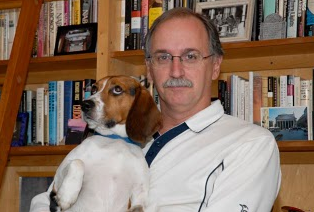Jim Shepard's Blog, page 5
September 8, 2011
“Reading helps you figure out how to decode the world”
September 2, 2011
“I have two words for people who think they don’t like the short form: Jim Shepard”
August 31, 2011
Jim Shepard interviewed on Leonard Lopate Show
WNYC’s Leonard Lopate interviews Jim Shepard. Click here for the recording.
From Leonard Lopate’s website: “Jim Shepard tells us about his wildly diverse collection of observant stories, You Think That’s Bad: Stories. His writing shows the vastness of human experience—from the fringes and lonely pinnacles to the hopelessly mediocre and desperately below average—with brilliant scientists, reluctant soldiers, workaholic artists, female explorers, depraved murderers, and deluded losers.”








August 29, 2011
Jim Shepard Shout-outs
Denver Book Club is going to discuss Jim’s amazing story, “Sans Farine,” in the community room of Whole Foods at Tamarac. Click here for details.
Christina Palassio of the Toronto Standard brings “Like You’d Understand, Anyway” to the beach and contemplates ‘Pleasure Boating in Lituya Bay,’ writing “Shepard’s description is so vivid that within a few sentences you feel the claustrophobia of the darkening sky, hear the thunder of the wave as it builds, see the water as it crests over the hill, cheek-to-cheek with the rumbling clouds. It’s terrifying and majestic.” Read the full article and learn more about Sugar beach here
And the blog “Booked Up” loved “You Think That’s Bad.” (They also deserve the photo credit for the picture above)








August 9, 2011
Jim Shepard Interviewed on Fresh Air
Sorry this blog has not been updated in a while, but thank you all for your visits and messages! As many of you know, Dave Davies of Fresh Air interviewed Jim Shepard back in June and it was a wonderful interview. Here is an excerpt of the interview, which you can listen to here.
DAVE DAVIES, host:
Well, Jim Shepard, welcome to FRESH AIR. You know, the most common advice we hear given to aspiring writers is write what you know, draw on your own experience for detail and insight. This collection of yours has a huge range.
It’s the story about a black ops specialist from the military, a British woman exploring the Middle East in the 1930s, a Japanese filmmaker in the ’50s, a French nobleman. Why do you embrace such diverse subjects?
Mr. JIM SHEPARD (Author): I think we’re not only hoping to write what we know as literary fiction writers. I think we’re also hoping to write what we can imagine, as well. I think literature is, in some ways, about the exercise of the empathetic imagination, and I’m always interested in stretching that capacity.
I’m also always interested in engaging the world and trying to enlarge my own sense of experience, and so I’m not only looking to reflect my own inner turmoil, which I’m certainly doing, but I’m also looking to teach myself about the world and teach the reader as I do it.
DAVIES: So when you’re writing in the voice of a British woman in the 1930s or a Japanese filmmaker, how do you know you’re getting it right?
Mr. SHEPARD: Boy, that’s a good question. A lot of the time, you fret that you’re not. But what’ll happen is I will immerse myself in a lot of primary documents, until I feel as though I’m starting to get the rhythms and the cadences of that kind of voice down.
Having satisfied myself at some laborious point in the future that I’m doing as well as I think I can do it, I will then often run it by people who know the world better than I do and say: Does any of this sound howlingly(ph) bad or off? Or something like that, as well.
DAVIES: So let’s look at an example of what you do here. The story “The Netherlands Lives with Water” is a sobering vision of climate change, and it’s set in, like, 2030, where water’s rising everywhere. And you look at a family in the Netherlands.
The husband, I guess, is like a civil engineer, right, who manages sophisticated water containment systems, and then he has a wife and a son. And why don’t you give us a reading here? This is a moment, kind of a climactic moment, where things are getting bad. Maybe just explain -set this up, if you will. Explain, you know, who the names are and what’s exactly happening here.
Mr. SHEPARD: Okay. The man is presiding over, late in the story, the sort of juxtaposition of a massive storm and massive outflows from the Rhine that are flooding Rotterdam exactly as he feared they would. And he has discovered that his wife, Cato, has taken their son to Berlin in order to keep him safe, but also, in a way, to separate from him emotionally. So he’s having a sort of double catastrophe come down on him at once. And this is, again, fairly late in the story.
(Reading) The window’s immense pane shudders and flexes before me from the force of what’s pouring out of the North Sea. Water is beginning to run its fingers under the seal on the sash. Cato will send me wry and brisk and newsy text updates whether she receives answers or not, and Henk will author a few, as well.
Everyone in Berlin will track the developments on the monitors above them while they shop or travel or work, the teaser heading reading something like: The Netherlands under siege. Some of the more sober will think: That could have been us.”
Read the rest of the interview here. And even better: click here for the audio version of Jim’s interview.








May 25, 2011
Photo of the Day
Hat tip to Michael Maren – Karen Russell, Jim Shepard, Ben Marcus, listening to Sloane Crosley @powerHouseArena on May 24








Chicago Tribune Reviews You Think That’s Bad
 The intrepid British travel writer Freya Stark, best known for her wanderings in the Middle East before the midpoint of the twentieth century, was in remote precincts of Persia in the mid-1930s when she was struck with malaria. As she reports in her book, “The Valleys of the Assassins” (named for a Shia sect that employed murder as a political tool), she lay there “not expecting to recover,” looking over a barren landscape whose nakedness, “was in itself a preparation for the greater nakedness of death.”
The intrepid British travel writer Freya Stark, best known for her wanderings in the Middle East before the midpoint of the twentieth century, was in remote precincts of Persia in the mid-1930s when she was struck with malaria. As she reports in her book, “The Valleys of the Assassins” (named for a Shia sect that employed murder as a political tool), she lay there “not expecting to recover,” looking over a barren landscape whose nakedness, “was in itself a preparation for the greater nakedness of death.”
We will meet Freya and her assistants, the guide Ismail and muleteer Aziz, in Jim Shepard’s “The Track of the Assassins,” one of the standout short stories in his new fiction collection “You Think That’s Bad.” She is weak with malaria as the story ends, but Ismail has just washed her face with water from a goatskin and wished her well. They exchange smiles and she tells us, “My eyes close under the weight of so much sadness and gratitude.”
The stories in “You Think That’s Bad” are heavily threaded with sadness and gratitude, in fact: sadness for the disappointments that seem ever to beset our relationships, and gratitude for the thrill that walking in the world can otherwise entail. The hope that such disparate wellsprings of emotion can be reconciled – or at least, the conflict between them minimized – becomes a driving force in Shepard’s stories.
As a Polish mountaineer expresses it, in a story that hinges on tension between the climbers’ appetite for death-defying excitement and their wives’ consistent anticipation of widowhood, not to mention months-long abandonment as the lesser alternative, “The mountains seemed to us another chance, our attempt to understand ourselves and exorcise those aspects we detested. To become the sort of person we could begin to respect.”
A word on history here: That story, titled “Poland Is Watching,” is saturated with a background motif of national pride that reflects Polish climbers’ (real historical) notoriety in wintertime climbing in the Himalayas. Just as the historical Freya Stark was re-deployed in “The Track of the Assassins,” so those who made the film “Godzilla” will be in “Gojira, King of the Monsters” (the film was retitled in the West): special-effects master Eiji Tsuburaya, director Ishiro Honda, and stunt man Haruo Nakajima in reptilian guise. In “Classical Scenes of Farewell,” the most chilling, disturbing story in the collection, the Medieval French aristocrat and army marshal Gilles de Rais and his henchmen, executed in 1440 for serial murder of children, are reprised, in confessional narration by Etienne Corillaut, de Rais’s page.
Shepard’s use of relatively accurate biographical fact is bent to his own dramatic needs. Unlike memoirs that skew the truth, this is fiction that uses truth to warp into its own staged, often memoir-like reality. Affect — the feeling of the lived moment — is Shepard’s quarry, in contexts that range from the Netherlands in a futuristic flood crisis (already, “Bangladesh was almost entirely a bay”) to the South Pacific during the Second World War to upstate New York to the environs of the Large Hadron Collider near Geneva, Switzerland.
At the collider (and all of Shepard’s stories can be thought of as mini-colliders), the physicist narrator remarks, “All of us have kids and spouses and pets and hobbies, but that’s not where we live. Where we live is that part of the cortex where we do our model building.” His wife, who by his description felt he “wasn’t entirely on board for the stunned-by-grief-thing” after she had a miscarriage, asks him, “What are you really looking for?” and he responds “That saving thing, I think: something that right now is beyond our ability even to imagine.”
That is the dilemma faced by many of Shepard’s people: they can spot the problem but have trouble groping their way toward a solution. And often as not, home life has been a hatchery of unhappiness. In “Your Fate Hurtles Down at You,” a young man doing avalanche research angrily considers writing to his sister, who has accused him of shedding suffering by walking away from everyone, that, “In our family the most exacting labor had been required to obtain the bleakest of essentials.” Freya Stark observes of herself and a sister that their mother, “filled with happiness herself, had never noticed that our lives were heaped about in miniature ruins.” In the World War II story, a pair of brothers watches their father eye them critically from top to bottom. One brother leaves, teary-eyed, but the other, who narrates the story, “hung around for a minute, to see if it was just my brother or both of us he hated.”
A sense of disconnection between people runs freely through the stories in “You Think That’s Bad,” sometimes the result of intentional withdrawal, sometimes not. In “Gojira, King of the Monsters,” Tsuburaya and his wife Masano “sat facing each other like mirror images of defeat,” him pleased at being able to provide their son employment, she distressed that her husband had ignored her wishes in doing so. At another point – and perfectly suggesting the emotional duality so commonly on display in Shepard’s work – she tells their son when Tsuburaya arrives home from work, “There he is with his warm smile. Orchestrating his catastrophes.”
The full review can be found here.








May 20, 2011
Jim reads in Brooklyn, May 24
May 18, 2011
Jim Shepard Reads at Broadway Books in Portland Tonight!
Calling all PDX-ers – be sure to stop by Broadway Books at 7:00 pm tonight. Don’t miss it!
Here is the link: http://www.broadwaybooks.net/Events.html
I’m coming too and I look forward to meeting you!








Jim Shepard's Blog
- Jim Shepard's profile
- 302 followers


































